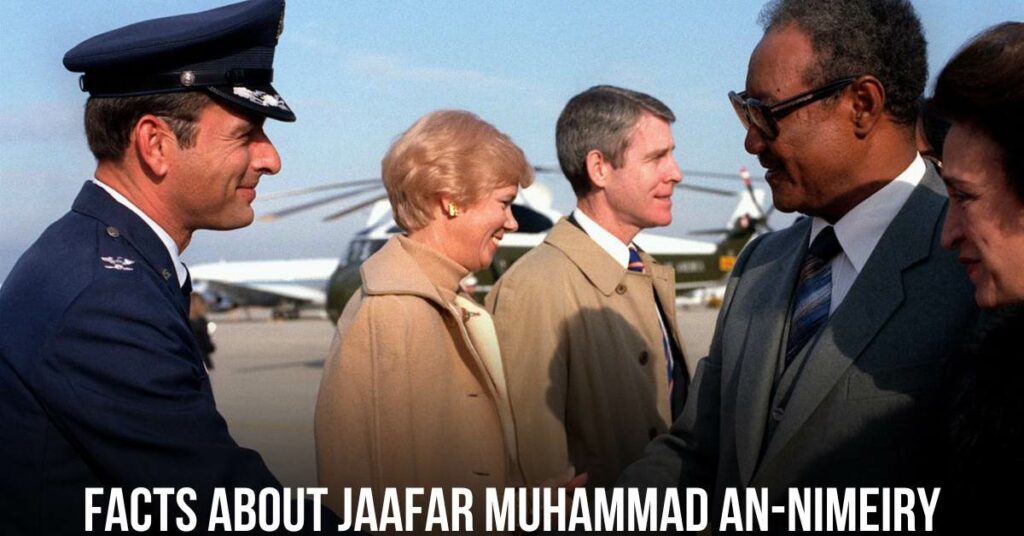Jaafar Muhammad an-Nimeiry, is a name that echoes through Sudanese history with a resonance that’s impossible to ignore.
As the former President of Sudan, his life was marked by twists and turns, power struggles, and impactful decisions that continue to shape the nation. In this article, we embark on a journey through the remarkable life and legacy of Jaafar an-Nimeiry, uncovering 12 astonishing facts that shed light on the man behind politics.
1. Over Two Decades in Power
Jaafar an-Nimeiry was not just a leader; he was the President of Sudan for a staggering 16 years. His tenure, which began in 1969, left an indelible mark on Sudanese politics.
2. A Coup to Seize Power
In May 1969, an-Nimeiry orchestrated a military coup that successfully toppled the government of Sudan. This audacious move catapulted him into the presidency and set the stage for his long-lasting rule.
3. The Advent of Socialist Policies
During his presidency, an-Nimeiry adopted a socialist ideology, leading to the nationalization of key industries and wealth redistribution. These policies had a profound impact on Sudan’s societal and economic landscape.
4. The Introduction of Sharia Law
One of his most controversial decisions was the introduction of Sharia law as the foundation of Sudanese legislation. This move significantly altered the country’s legal system and social fabric.
5. Negotiating an End to Civil War
An-Nimeiry played a pivotal role in the negotiations to end the First Sudanese Civil War. His efforts culminated in the signing of the Addis Ababa Agreement in 1972, temporarily halting the civil war.
6. Surviving Multiple Assassination Attempts
Throughout his presidency, an-Nimeiry faced numerous assassination attempts orchestrated by various opposition groups. These plots highlighted the political tensions and volatility of his rule.
7. Building International Alliances
Recognizing the importance of global partnerships, an-Nimeiry cultivated relationships with international powers such as the United States, Soviet Union, and Arab nations. These alliances influenced Sudan’s foreign policy and global standing.
8. Temporary Deposition in 1985
In 1985, a popular uprising led to an-Nimeiry’s removal from office. The Sudanese people, discontent with his autocratic rule and economic mismanagement, demanded a change in leadership.
9. Exile and Controversy
Following his removal from power, an-Nimeiry lived in exile in Egypt and Libya. He remained a divisive figure, with some supporting his policies and others vehemently opposing his authoritarian rule.
10. Return to Sudan in 1999
In 1999, after years of exile, an-Nimeiry returned to Sudan, attempting a political comeback. However, his reentry into politics was met with mixed reactions and did not result in a significant resurgence of power.
11. The Passing of a Polarizing Figure
On May 30, 2009, after a prolonged battle with illness, Jaafar an-Nimeiry passed away. His death marked the end of an era in Sudanese politics, leaving a legacy that continues to spark debate and discussion.
12. A Complex and Polarizing Legacy
An-Nimeiry’s legacy is a multifaceted one, marked by both supporters who view him as a visionary leader and critics who condemn his authoritarian practices. His presidency serves as a reminder of the intricate nature of political leadership and its profound impact on a nation.
In conclusion, Jaafar Muhammad an-Nimeiry’s life and career were nothing short of extraordinary. From his audacious coup to his controversial policies and enduring impact on Sudan, his story is a testament to the complexities of leadership. Acknowledging the positive and negative aspects of his rule is essential to understanding the profound and lasting consequences it had on Sudan and its people. Jaafar an-Nimeiry’s legacy continues to shape the nation, offering valuable insights into the challenges and intricacies of leadership on a global scale.
